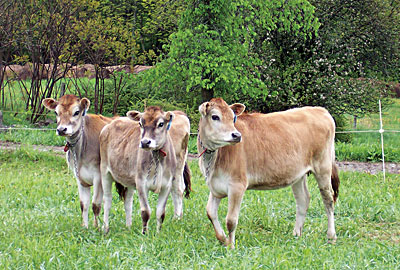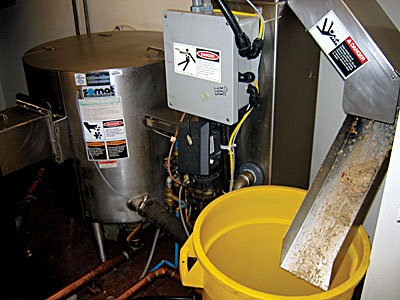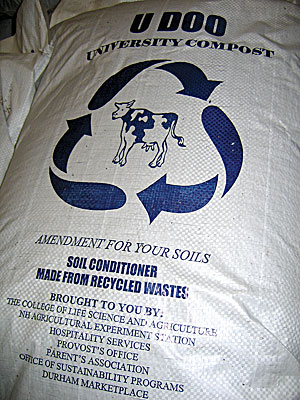 |
| The University of New Hampshire recently established the first organic research dairy at a land grant university, hoping to sustain the grass-fed dairy operations that are a vital part of the region’s culture and heritage. Photo courtesy of UNH Organic Research Dairy. |
Higher Education Gets Smarter: UNH Commits to Sustainable Food
By Marina Schauffler
Many Maine colleges and universities are taking significant steps toward greater sustainability, but few have made as substantial a commitment as the University of New Hampshire (UNH) in Durham to fostering a sustainable food community – on campus and beyond.
Efforts to transform UNH began just as I was completing graduate studies there in the late 1990s. I didn’t pay close attention to these changes until recently, when I received a copy of the new book The Sustainable Learning Community: One University’s Journey to the Future (edited by John Aber, Tom Kelly and Bruce Mallory, University of New Hampshire Press, 2009). While I knew first-hand that UNH had some exceptional faculty and a strong commitment to environmental sciences, I was still surprised to learn what the university has achieved through a dozen years of committed effort. Among the broad spectrum of changes made there, this piece highlights how UNH is adopting sustainable food practices in the dairy pasture, dining hall and everywhere in between.
Beginnings
Thanks to a generous alumnus (the late Oliver Hubbard), UNH created in 1997 the nation’s first endowed sustainability program in higher education. The $10 million endowment allowed UNH to hire Tom Kelly to head its sustainability efforts. Colleagues say he has been instrumental in getting sustainability to be a “core tenet of the institution.” University Provost John Aber and others credit Kelly with many of the successes achieved to date, saying he “always looks for opportunities, brings people together, and treats everyone as important.”
 |
| Cafeteria food waste at all UNH dining halls is pulverized in pulpers before being transported to Kingman Farm for composting, after which it is sold as U Doo. Photos by Marina Schauffler. |
 |
Kelly laid out a framework that would go beyond just “greening” campus operations to touching every facet of university life (with food recognized as a critical element – in terms of nutrition, security, energy, climate impacts and biodiversity). Working closely with colleagues across campus, Kelly and others began seeding initiatives in four areas: curriculum, operations, research and engagement.
Curriculum: Forging New Connections
“Sustainability is fundamentally about education,” Kelly observes in the book, “because it continually presents questions of value and practice by asking what is best and why, for the long run.” Those questions surface in a growing number of classes – where students wrestle with how sustainability plays out in realms as diverse as earth systems, nutrition, economics, dairy management and hospitality.
First-year students can take a course entitled “The Real Dirt: Ecological and Sustainable Food and Farming,” which has them visiting farms, composting operations and farmers’ markets. Undergraduates can pursue a sustainable living minor, and this fall, 64 students took the introductory course of a new ecogastronomy dual major (completed alongside a primary major), which helps students grasp the complexities of food systems through integrated study of sustainable agriculture, nutrition and hospitality. Students in the program will spend a semester at the University of Gastronomic Sciences in Pollenzo, Italy (run by Slow Food founder Carlo Petrini). UNH was the first U.S. university to formally adopt the Slow Food principles, and it awarded Petrini an honorary doctorate in 2006.
Operations: Demonstrating the Food Web
UNH Dining serves more than 70,0000 meals per week during the school year and composts approximately 200,000 pounds of food waste annually at Kingman Farm, a 350-acre property that houses the USDA Agricultural Experiment Station. Composting began more than a decade ago, says Rick MacDonald, assistant food services director, “part of a commitment to sustainability that is at every level from the top down. The whole philosophy here at UNH is that everything is a classroom.”
Students run much of the composting program, and financial support for the effort has come largely from UNH Dining (with additional support for the compost turner and tractor from the UNH Parents Association and the College of Life Sciences and Agriculture). Finished, bagged compost is sold to community members as “U Doo.” Because tipping fees for the school aren’t broken out by buildings, MacDonald can’t calculate the exact cost/savings ratio for the operation, but says “We invest in composting because we think it’s the right thing to do: it’s part of our culture.”
For more than a decade, UNH Dining has bought New Hampshire-produced yogurt, Vermont cheese, and regional meat and chicken. Some squash and apples have come from UNH research farms, but MacDonald says it’s an ongoing challenge to source food from New England farms, given the high volumes required. Most area farms retail through markets and CSA operations, earning more that way than the university could pay. But MacDonald keeps trying: “We committed to buy New Hampshire eggs and simply find the savings elsewhere,” he says. “Someone has to drive the market.”
One way the university supports smaller local producers is through its local harvest dinner, a celebratory and educational event with more than 35 local firms and farms supplying foods for an elaborate menu (with dishes such as “smoked duck and Boursin cheese flatbread” and “naturally raised lamb stew”). The dinner, open to students, faculty, staff and the larger community, first served 1,600 diners in 2005 and now draws 3,700 people.
In addition to instituting many energy-efficiency measures, UNH Dining began offering continuous hours (unlimited access) at its dining halls – a move some predicted would send food costs soaring and generate rampant waste. Instead, meal plan sales have risen steadily and students waste far less food, no longer needing to stock up.
“We question every decision, asking, ‘Is this sustainable? Can we do this better?” MacDonald explains. “We can’t make the most sustainable choice every time, but that process helps people feel part of something bigger.”
Research: A Systems Approach to Agriculture
UNH is experiencing a remarkable revitalization of its agricultural curriculum, which was close to disappearing a decade ago. Now UNH is actively fostering “place-based agriculture,” Provost John Aber says, “which is exactly what we should be doing – given the benefits it offers to the local economy and sectors like tourism.” The university is creating a sustainable agriculture major (beginning in September 2010) and hiring several new faculty.
This revival is linked to a decision UNH made in 2005 to launch the nation’s first organic research dairy at a land grant university, helping foster the grass-based, organic dairy farming so central to the heritage and culture of New England. Nearly $2 million in support for the dairy has come from diverse quarters (with Stonyfield Farm of Londonderry, New Hampshire, providing a leading gift – the largest it has ever made).
The university chose to revive a largely idle 200-acre farm it owned along the federally designated “wild and scenic” Lamprey River. It’s a wonderful setting for applied research with an agroecosystem perspective, says farm superintendent Trent Schriefer, “as there’s something for everyone – whether an agronomist, dairy scientist, soil scientist, climate scientist, local school group or birdwatcher. It’s a nice vehicle for getting people to work together.”
He hopes the farm, which now has a thriving herd of 50-plus Jersey cows, will bridge the gap between farmers and communities, examining all the critical dimensions of farm life: production, economics, personal quality of life and community impacts.
Research at the farm is underway (see
www.colsa.unh.edu/aes/odrf/research/projects.html), and the dairy plans to offer workshops, courses for new organic dairy farmers and field days.Engagement: Reaching Out
Knowing that sustainable choices begin with the individual (and that today’s students face unprecedented challenges with obesity and diabetes), UNH dietitian Rochelle L’Italien has developed a “Smart Eating Choices” campaign (www.unh.edu/dining/nutrition/resources.html) with posters and brochures that encourage students to plan their meals around whole foods, eating at each sitting fruit and vegetables (50 percent), whole grains (25 percent) and lean protein (25 percent). Each student receives an Eat Good, Do Good guide that illustrates what foods to purchase locally and how to tie into food-related efforts (such as weekly Slow Food chapter gatherings and monthly community suppers).
Many students volunteer in the student-run UNH Organic Garden Club, which grows vegetables on a 2-acre on-campus parcel with help from a student farm manager. Begun in 2003, the garden has become a cherished part of campus life, with students selling vegetables at a farm stand and providing produce for community suppers, area shelters and food banks.
Beyond campus, the UNH Office of Sustainability works to improve community food security by helping regional farmers become less vulnerable to forces such as globalization. It helped launch both the New Hampshire Farm to School Program (
www.nhfarmtoschool.org), and Food Solutions New England, which fosters community initiatives that improve nutrition and food security.Creating a New Culture
How did UNH implement so many changes, given institutional forces that can derail such efforts? Kelly and Aber both credit the faculty and staff, many of whom are creative, sensitive to environmental concerns, and interdisciplinary in their outlook.
UNH is also remarkably flexible and non-hierarchical – perhaps, Aber speculates with a smile, because it “has few administrators, so there’s not enough inertia at upper levels to stop new initiatives.”
Many factors that could have been obstacles – tight budgets and lack of research funding – have been turned to good advantage. Once seen as a “cost center” by state leaders, the university now has what Aber describes as a “mutually supportive relationship” with decision-makers. Efficiency measures that have dramatically lowered the carbon footprint of the university, such as a cogeneneration plant that meets 80 percent of campus heating needs with methane from a Rochester landfill, will bring significant financial savings over time. And lack of federal and commercial money for research gave UNH license to take a more innovative approach encompassing agroecosystem work.
Talking with staff and faculty across campus, I was struck by how collaborative and constructive everyone seemed. They have, by their own admission, “gotten out of their silos,” and each is contributing to making the whole learning community more sustainable.
They seem to derive great energy and satisfaction from striving toward that larger vision. Making the institution more sustainable appears to make the day-to-day work lives of staff and faculty more creative, engaging and satisfying. Kingman Farm manager John McLean, reflecting on his role advising the student-run Organic Garden Club, puts it this way: “I don’t see it as more work. It probably is, but I don’t see it that way, because I so enjoy the students and the new perspectives they bring.”
About the author: Marina Schauffler, an environmental writer and consultant in Camden, is author of Turning to Earth.
